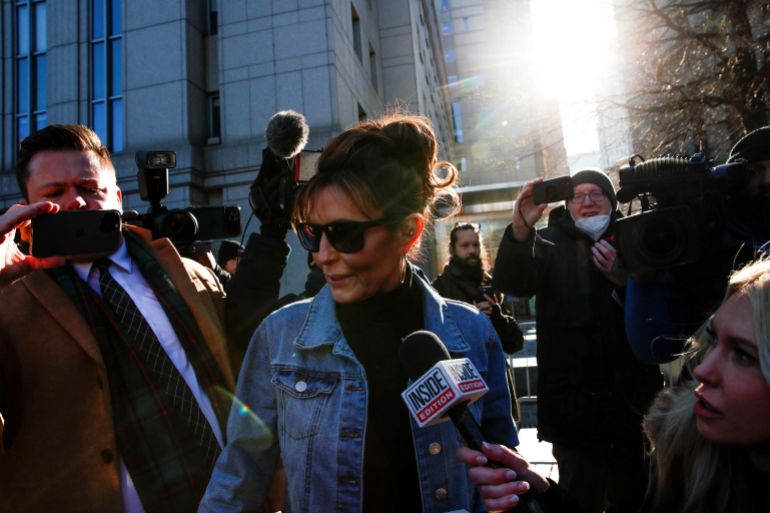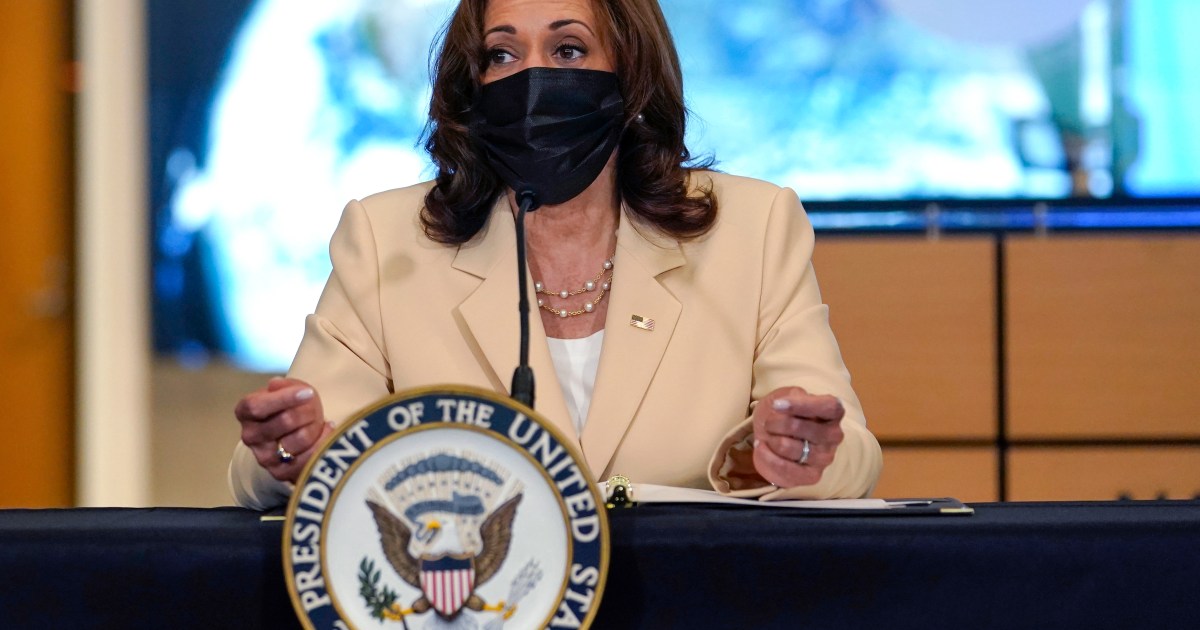US jury rejects Sarah Palin’s lawsuit against The New York Times | Politics News
Palin had sued the newspaper claiming it maliciously and erroneously linked her campaign to a mass shooting.
Former Alaska Governor Sarah Palin has lost her libel lawsuit against The New York Times after a jury in the United States rejected her claim that the newspaper maliciously damaged her reputation.
A US judge had already declared he would dismiss the case on the grounds that Palin had not proven the newspaper acted with malice – or intent to harm her reputation – by publishing false information.
Palin, a 2008 Republican vice-presidential nominee, sued the newspaper in 2017 claiming it had damaged her political career with an editorial about gun control published after a man opened fire on a congressional baseball team practice in Alexandria, Virginia.
Congressman Steve Scalise, a Republican leader in the House of Representatives, and three others were wounded after a man with a history of anti-Republican activity opened fire.
In the editorial, the Times blamed overheated political rhetoric. It likened the shooting to a 2011 massacre in Arizona that left six dead and severely wounded former US Representative Gabby Giffords.
The Times said Palin’s political action committee had contributed to an atmosphere of violence at the time by circulating a map of electoral districts that marked Giffords and 19 other Democrats as targets.
Editorial page editor James Bennet wrote that “the link to political incitement was clear” between the 2011 shooting and the map previously published by Palin’s political action committee that depicted Giffords under “stylized crosshairs”.
In a correction shortly after the editorial was published, The Times said it had “incorrectly stated that a link existed between political rhetoric and the 2011 shooting” and that it had “incorrectly described” the map. A Times tweet read, “We got an important fact wrong.”
At the trial, Palin cast herself as a victim of biased journalism by a left-leaning, elitist media institution eager to embarrass a pro-gun politician.
“It was devastating to read a false accusation that I had anything to do with murder,” Palin said. “I felt powerless – that I was up against Goliath … I was David.”
 Sarah Palin, 2008 Republican vice presidential candidate and former Alaska governor, sued the newspaper in 2017 [Jane Rosenberg/Reuters]
Sarah Palin, 2008 Republican vice presidential candidate and former Alaska governor, sued the newspaper in 2017 [Jane Rosenberg/Reuters]In closing arguments, Palin’s lawyer Kenneth Turkel called the editorial an example of how The Times “treated people on the right they don’t agree with … They don’t care. She’s just one of ‘them’.”
For his part, The Times’s lawyer David Axelrod called the case “incredibly important because it’s about freedom of the press”.
The First Amendment protects journalists “who make an honest mistake when they write about a person like Sarah Palin … That’s all this was about – an honest mistake,” Axelrod said.
It was an uphill battle for Palin. The jury had to decide whether former Times editor Bennet acted with “actual malice” against a public figure or with “reckless disregard” for the truth when he inserted the disputed wording into the piece.
Under US Supreme Court precedents, libel claims involving public figures must prove “actual malice” – a legal element that means the derogatory material was published with knowledge it was false, or reckless disregard for whether it was false.
US District Judge Jed Rakoff had informed lawyers on Monday, with the jury outside of the courtroom, that Palin had failed to show that The Times had acted out of malice. Rakoff had said he would wait to formally enter the judgement when the trial ends.
 Palin said during the trial that ‘it was devastating to read a false accusation that [she] had anything to do with murder’ [Eduardo Munoz/Reuters]
Palin said during the trial that ‘it was devastating to read a false accusation that [she] had anything to do with murder’ [Eduardo Munoz/Reuters]“This is the kind of case that inevitably goes up on appeal,” Rakoff said, adding that the appeals court “would greatly benefit from knowing how the jury would decide it”.
At trial, Bennet had testified that he botched the edit, but meant no harm. “I’ve regretted it pretty much every day since,” he said.
He and other New York Times staffers testified about the great lengths taken to correct the error the morning after the piece was published. He also said he wanted to apologise to Palin but was prohibited by a Times policy against making personal apologies.
The Times’s defence lawyers asserted the editorial was predominantly about inflammatory political rhetoric and only made a passing reference to Palin’s political committee, which by law, is an entity that is separate from her. Palin pushed back, saying, the PAC “is me”.
“My name, my voice, my face,” she said.




